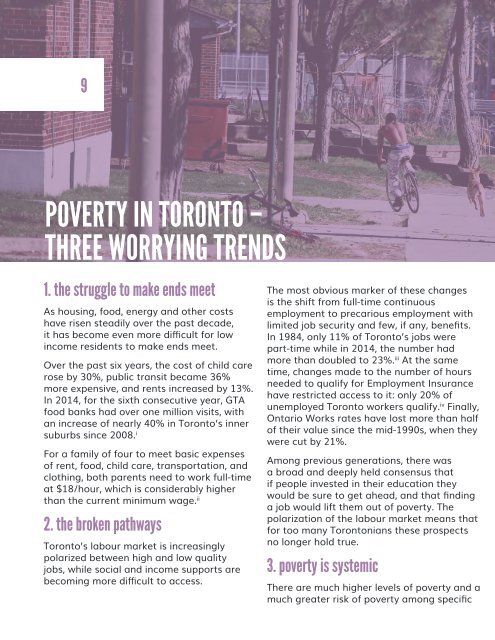TO Prosperity: Toronto Poverty Reduction Strategy
Create successful ePaper yourself
Turn your PDF publications into a flip-book with our unique Google optimized e-Paper software.
9<br />
POVERTY IN <strong>TO</strong>RON<strong>TO</strong> –<br />
THREE WORRYING TRENDS<br />
1. the struggle to make ends meet<br />
As housing, food, energy and other costs<br />
have risen steadily over the past decade,<br />
it has become even more difficult for low<br />
income residents to make ends meet.<br />
Over the past six years, the cost of child care<br />
rose by 30%, public transit became 36%<br />
more expensive, and rents increased by 13%.<br />
In 2014, for the sixth consecutive year, GTA<br />
food banks had over one million visits, with<br />
an increase of nearly 40% in <strong>Toronto</strong>’s inner<br />
suburbs since 2008. i<br />
For a family of four to meet basic expenses<br />
of rent, food, child care, transportation, and<br />
clothing, both parents need to work full-time<br />
at $18/hour, which is considerably higher<br />
than the current minimum wage. ii<br />
2. the broken pathways<br />
<strong>Toronto</strong>’s labour market is increasingly<br />
polarized between high and low quality<br />
jobs, while social and income supports are<br />
becoming more difficult to access.<br />
The most obvious marker of these changes<br />
is the shift from full-time continuous<br />
employment to precarious employment with<br />
limited job security and few, if any, benefits.<br />
In 1984, only 11% of <strong>Toronto</strong>’s jobs were<br />
part-time while in 2014, the number had<br />
more than doubled to 23%. iii At the same<br />
time, changes made to the number of hours<br />
needed to qualify for Employment Insurance<br />
have restricted access to it: only 20% of<br />
unemployed <strong>Toronto</strong> workers qualify. iv Finally,<br />
Ontario Works rates have lost more than half<br />
of their value since the mid-1990s, when they<br />
were cut by 21%.<br />
Among previous generations, there was<br />
a broad and deeply held consensus that<br />
if people invested in their education they<br />
would be sure to get ahead, and that finding<br />
a job would lift them out of poverty. The<br />
polarization of the labour market means that<br />
for too many <strong>Toronto</strong>nians these prospects<br />
no longer hold true.<br />
3. poverty is systemic<br />
There are much higher levels of poverty and a<br />
much greater risk of poverty among specific

















